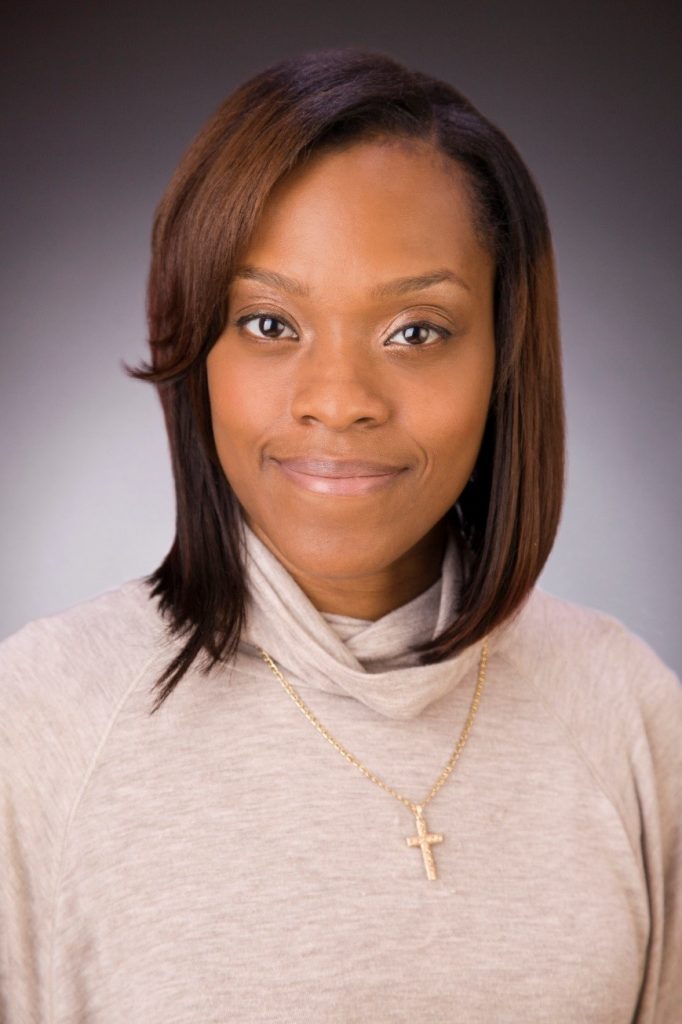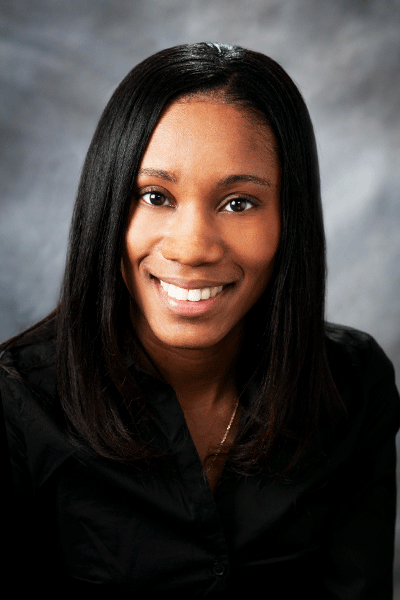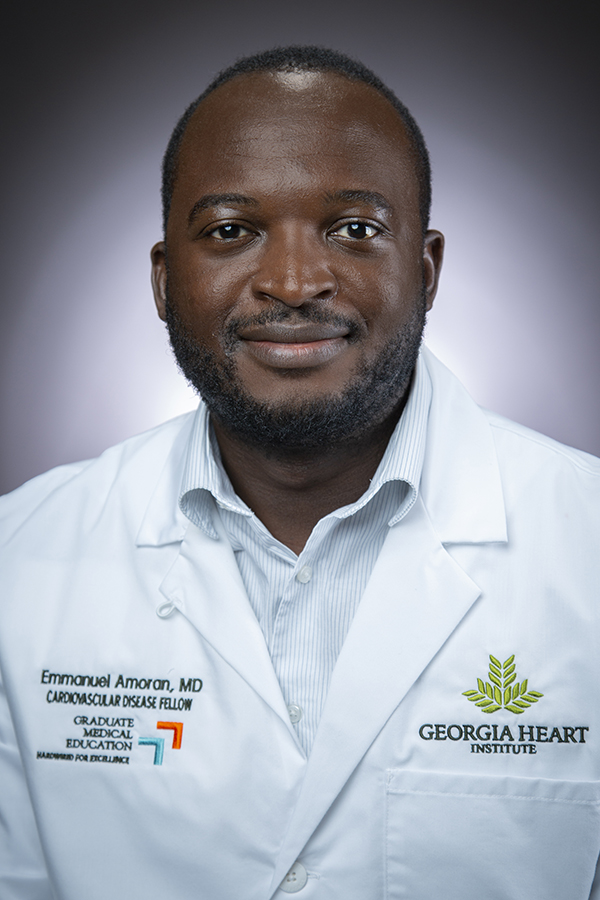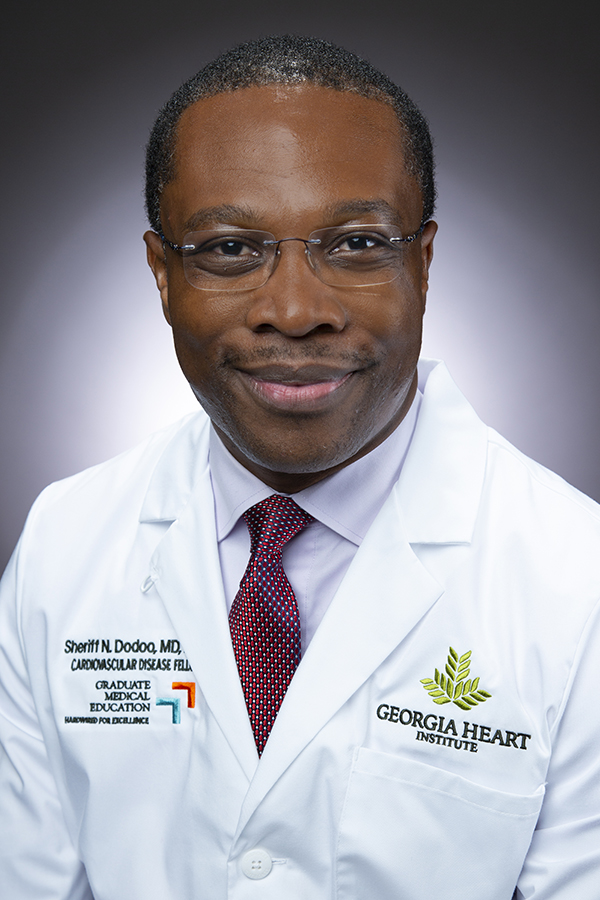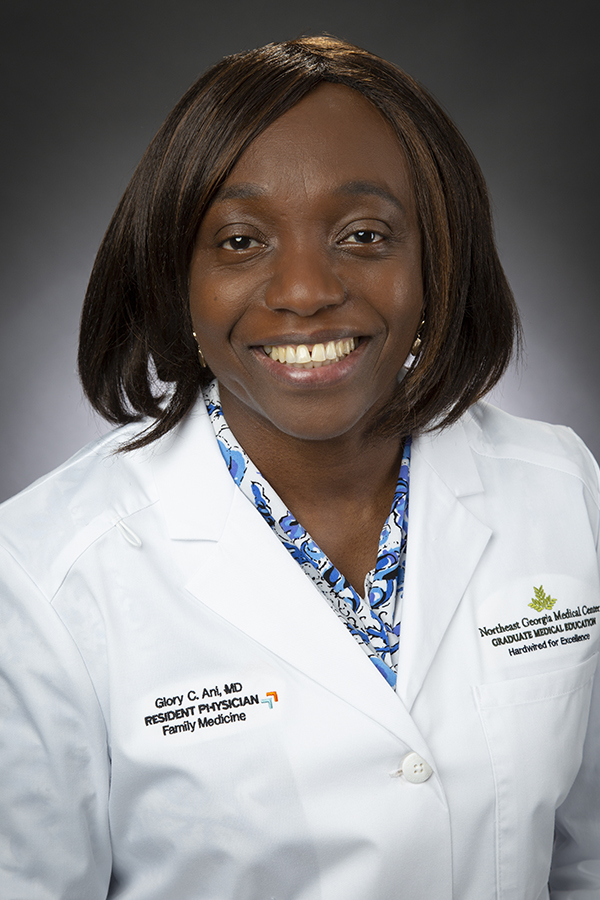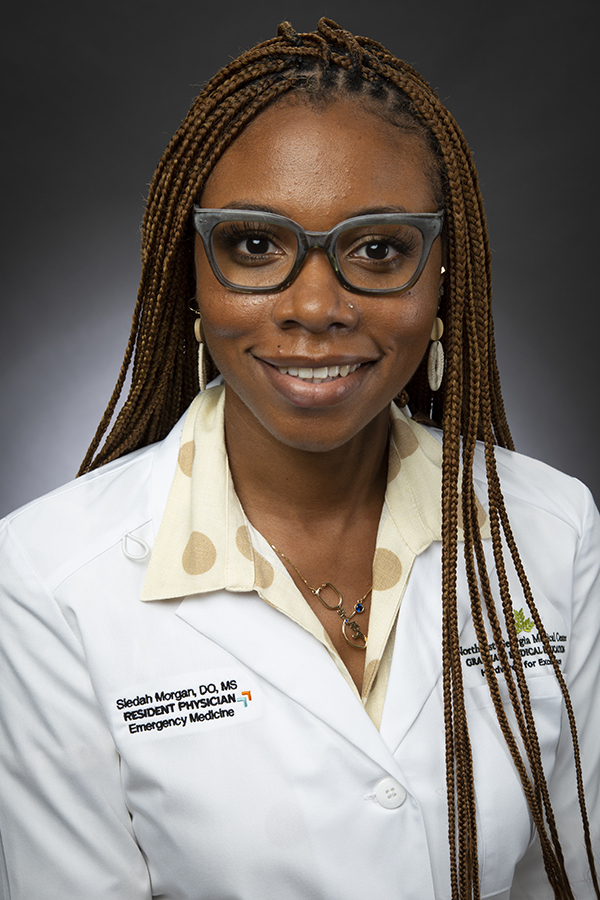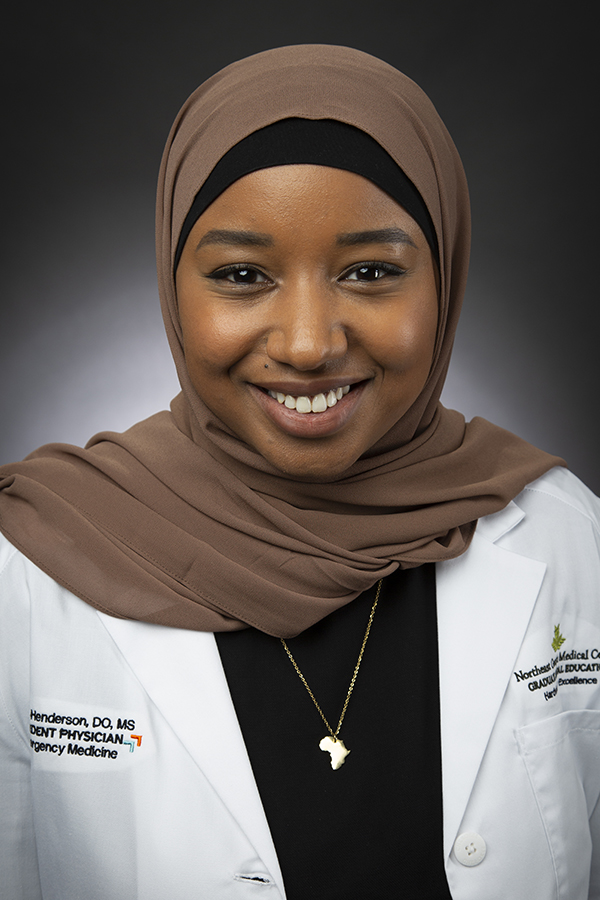Read on to find out what Black History Month means to our amazing residents and faculty!
Erine Raybon-Rojas, MD
Pulmonary and Critical Care Fellowship Program Director
Director of Diversity & Inclusion for GME.
Director of MICU Rotation, Critical Care
Born in Illinois; lived in Georgia since the age of four.
As a black physician, I take on many roles. Representation in any avenue is important because it shows younger generations that their dreams are attainable. I really looked up to Ben Carson as a kid because he was the only black physician that I saw. I read his books, wrote school reports about him and even dressed up as Dr. Carson for an elementary school event! He inspired me to see what was possible. In the same way, I hope that we all – regardless of profession or path in life – can show younger generations that dreams are possible. As an African American physician, I’m only here because of the sacrifices that others have made. My duty is to speak up for those who may not have the opportunity to create equity amongst all.
I’m proud to come from a lineage of civil rights activists, including my parents and grandparents. My inheritance is witnessing what their activism has achieved. If you really think about it, the Civil Rights Movement that occurred around the 1960s is only one generation removed from us. I hope to make my family proud and produce some of the fruits of their advocacy.
I also love the connection I have with black patients. Statistically, there are fewer African American physicians than physicians of European descent. It’s a special experience connecting with a patient who’s reluctant to engage with the healthcare community but becomes more at ease when they see something about themselves in their doctor. During the COVID-19 pandemic, this was one of the most important aspects of NGMC’s outreach to the African American community concerning prevention and vaccination.
Black History Month has evolved over time. As a child, it was a time to highlight black people in history who have contributed to communities and nations throughout the world. Today, Black History Month is also an opportunity to highlight black contributions towards activism, products, services and philosophies. Allyship is a large component of this. If we look at our current place in history and the cumulative efforts that have brought us here, I hope we can all realize the work that still needs to be done for civil and human rights. During the Civil Rights Movement, it wasn’t just African Americans who were activists. It was people of all different races and religions that were protesting for basic human and civil rights. I hope we can continue to challenge each other and use these opportunities to bring us together.
Idopise Umana, MD
Transitional Year Residency Program Director
Born in Nigeria and moved to the USA when I was six years old.
If you’re an African American like myself, every day is Black History Month. It’s great to have a month dedicated to black culture and history. But since we live in a multicultural world, I believe every culture should be celebrated constantly because every individual has some hidden “unconscious bias” that they’re unaware of. This month is a great reminder that we need to be mindful of other cultures and open towards others’ experiences.
My parents were a major influence on the person I have become and how I appreciate ethnicity. I grew up in a multicultural church, and while I was aware that I was black, race wasn’t the only focus growing up. As a minority, you’re hyper-attuned to certain situations, but you learn how to work through those difficult moments. As such, I feel that we must learn from difficult moments to help the next generation. Because of my own negative experiences, I’ve learned how to process those moments and help others going through similar experiences, whether they’re the residents, colleagues or my patients.
As a glass-half-full type of person, I enjoy seeing positive change, such as in the clinic or in our community. Not understanding someone’s different experience isn’t necessarily wrong, but I think we should try to understand different paths people take in life. If you aren’t open towards understanding what you don’t know, you could be losing out on a great relationship or something that might empower you and the other person! Everyone has “unconscious bias,” and it’s important to know the community that you’re working in and identify those who are underrepresented. There’s magic in being able to connect with others through similar experiences. I hope that we can be inclusive in who we bring to the table, particularly as a health system, and recognize how everyone has their own special perspective.
Each of us is different – we come from different backgrounds, families and times. That’s why I think it’s so important to get to know people for who they are. We must be sensitive towards how each person processes life experiences, but we must also remember that we’re all human at the end of the day.
Emmanuel Amoran, MD
PGY-4 Cardiovascular Disease Fellow
Born in Lagos, Nigeria and moved to the USA in 2016.
I am proud to be a Nigerian physician who trains and practices here in the United States. I don’t look at the statistics but rather, I’m a guy who puts in the work. When I know where I want to be, I keep putting myself out there and trying. Even though I was born and raised in Nigeria, I completed my medical degree at Semmelweis University in Hungary. I had classmates who later practiced in the United States and thought to myself, “If they can do it, why can’t I?” I came to the US to practice and then became a Cardiovascular Disease Fellow here at NGMC. It’s a blessing to contribute to my community and the world.
Black History Month is particularly important to African Americans, and I understand that. But for me, I’m always happy to help the people immediately around me regardless of ethnicity or background. I’m particularly happy that our NGMC GME program has several residents who are Nigerian as well. I know that having the right support group is so important, such as my wife and family. As such, I enjoy mentoring those who want to walk along the same path in life.
Sheriff Dodoo, MD
PGY-4 Cardiovascular Disease Fellow
Ghanaian born in Malumfashi, Nigeria. Returned to Ghana and attended Kwame Nkrumah University of Science and Technology Medical School. Moved to Meharry Medical College in Nashville, TN for internal medicine residency training.
One of my biggest inspirations for pursuing cardiology is my ethnic background. There are huge racial disparities in terms of the provider/patient relationship in the United States. About 13% of the total American population is black. Sadly, only 5% of physicians and 3% of cardiologists are black. Also, African Americans bear the brunt of mortality, ER visits and hospitalizations in the United States in terms of cardiovascular disease outcomes. Furthermore, the black community has, understandably based on situations like the Tuskegee Study, a mistrust towards conventional medicine and especially cardiology. It is difficult to penetrate a community when they feel that they don’t belong.
For me, it’s a privilege to practice cardiology and help spread the message of how we’re dealing with the battle against heart disease. Some individuals may be more receptive when they have a black physician. It is my own small way to bridge the disparity in healthcare between black Americans and other demographics.
Black History Month reminds us to pay things forward. When we talk about medicine in the black community, we must remember that decades ago, it was considered next to impossible for someone of African descent to pursue medicine, let alone cardiology. Black physicians had to experience the humiliation of sitting at the back of the class and being denied medical school admission even if they were fully qualified. Ultimately, their struggles paved the way for me to pursue medicine and cardiology. Because of them, it’s my duty to help future individuals push the envelope. I hope that I can continue to inspire others, including black, underserved and underrepresented minority communities, to consider medicine and cardiology.
As we celebrate Black History Month, I hope to spread a message of unity. It’s always good to embrace people of different backgrounds because we’re in this together as a human race.
Glory Chioma Ani, MD
PGY-1 Family Medicine resident
From Abia State, Nigeria and moved to the United States in 1997.
One day, during my ENT rotation as a medical student in Atlanta, a Nigerian mother brought her daughter in for an appointment. She was amazed that I shared her race and ethnicity and was practicing medicine. The mother even turned to her daughter and said, “Look! She’s Nigerian, a woman and a medical doctor. If she can do this, you can too!” This exchange showed me how I could be an inspiration to younger generations, specifically to people with the same cultural identity or race as me. Society tells these people that they’re incapable of greatness, but I and every other black doctor and medical professional defy these falsehoods. We show younger generations that they can achieve success no matter what their skin color may be.
Black History Month is a chance for everyone to learn the contributions black people have made to society. For example, Dr. Vivien Thomas, a black laboratory supervisor at The Johns Hopkins University School of Medicine, developed the surgical solutions for Tetralogy of Fallot. Emmet W. Chapelle was a black scientist who, while working at NASA, developed the technique for measuring gene expression using the light-producing enzyme luciferase. In the realm of general science, Mary Elliot Hill was a black chemist whose contributions through ketene synthesis led to the development of plastic. She was also one of the first black women to earn a master’s degree in chemistry. They, along with every black medical professional practicing and studying today, serve as role models for younger people to look up to. Additionally, by hearing more black stories from throughout all of history, people can reflect upon the past and present with a greater appreciation for these amazing trailblazers.
Siedah Morgan, DO, MS
PGY-1 Emergency Medicine resident
Born and raised in the Bronx, New York.
I am a first-generation American from parents of Jamaican descent. I spent the first eight years in the Bronx, then lived in the Hudson Valley region until my mid-20s. I feel privileged to be part of the diasporic experience. As a black individual, there’s an interesting dichotomy: on one hand, it can be uncomfortable walking into a space where there aren’t many people who look like you or share similarly lived experiences. On the other hand, it feels rewarding to be a voice for those who are often under and misrepresented in the healthcare system. I believe my voice can advocate for others by discovering how I can make a difference in the moment.
One of my greatest passions is mentoring young black aspiring physicians. I like to remind them of their strength and that life is a marathon, not a sprint. Be unwavering in your belief in yourself because you are on the right path – your own. I also encourage black aspiring physicians to lean on the strength of their ancestors. As eloquently posed by the great Maya Angelou, “We come as one, but we stand as 10,000.” Those who sacrificed their lives for us to be here will always serve as a guide and protection through any trials.
Black History Month reminds people that we’re an integral part of American history. It offers a beautiful chance to highlight the little-known aspects of our country’s history and the impact we’ve had on American culture at large. It is a time when we can reflect on national heroes such as Martin Luther King Jr., Rosa Parks, and newer influencers such as former President Barack Obama, Jay-Z, Oprah, Beyoncé and Rihanna.
I hope that people understand the unique experience that black physicians have. We’re one of the most underrepresented groups in medicine. My hope is to continue to use my voice for advocacy and change. Happy Black History Month!
Hawa Henderson, DO, MS, MA
PGY-1 Emergency Medicine resident
Born and raised in Knoxville, Tennessee.
A major factor that encouraged me to pursue medicine was knowing the impact I could have on patients as a black, visibly Muslim woman. My father is African American and my mother is a Sudanese immigrant. While working as a scribe between undergrad and medical school, a black patient had come in and kept looking to me even though I was only there to help with the ED physician’s dictation. This experience helped me understand the impact I could make in healthcare. Now as a resident, I’m happy to see the difference I make in patients’ lives.
When people see my hijab and skin color, they often recall certain preconceived notions. For example, some people may struggle with the idea that one can be both black and Muslim, but they’re not mutually exclusive identities. Islam has deep roots in both American as well as African history. While Islam is mainly associated with Arab culture, some of the first enslaved people brought to the United States were African Muslims. Once people get to know me, it’s a good opportunity for me to share my life and hopefully expel some of those preconceived notions.
As a physician, there are many privileges that come with the phrase “I am a doctor,” which can open seats at the table that were previously unthinkable. Minority and marginalized communities often get forgotten, particularly if no one is available to represent or advocate for them. This is why there’s a long history of distrust within the African American community towards the healthcare system. It’s comforting to patients when someone who looks like them says, “I’m your doctor.”
Black History Month is essentially American history because it highlights the achievements of black people within American history. We should also remember those who fought and died for just causes. Black populations in America have had to overcome numerous barriers to success, including social, financial and especially medical ones. For example, in 2008 the American Medical Association apologized for more than a century of policies that actively excluded African Americans.
Lastly, I hope that this month reminds us to learn from each other, uplift our colleagues and challenge preconceptions and unconscious biases. Black History Month isn’t just for black people. This is American history for all Americans.
To learn more about GME’s diversity, equity and inclusion program, visit ngmcgme.org/dei.

